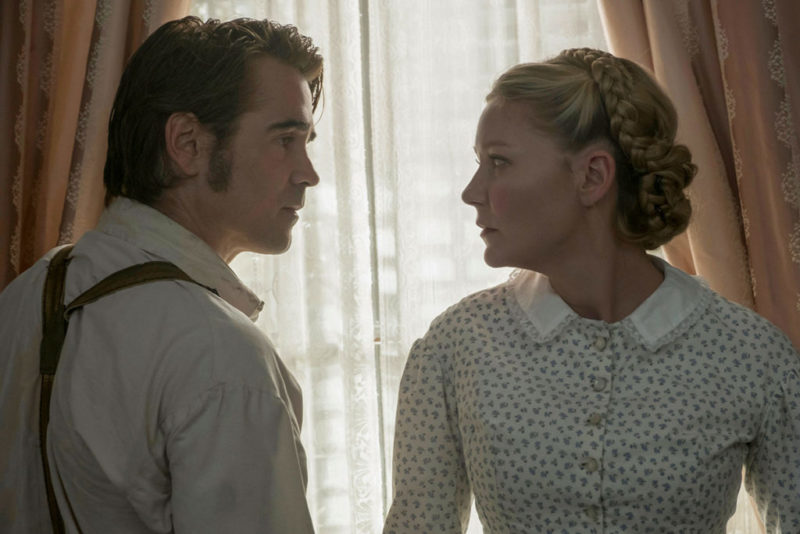
Colin Farrell and Kirsten Dunst in “The Beguiled” (Photo by Ben Rothstein | Focus Features)
“Now those are some strong women,” my dad told me, exiting the Prytania Theater. “It’s an interesting contrast to Wonder Woman, don’t you think? Where everything is in-your-face in that movie, things are subtle in The Beguiled. It’s more grounded in our world.”
Subtle. Restrained. Ambiguous. Hazy. Just like the shots of shady oaks and fog hovering over the grounds of Madewood, a local plantation at which the movie was filmed. Subtle is one way to put it, and it surely is a relief from the constant action and adrenaline that current Hollywood can’t get enough of. While I agreed with my dad, I couldn’t help but get the sense that he meant to say The Beguiled’s style was superior to Wonder Woman‘s. Just like I begged my dad to see Wonder Woman with me, he was set on taking me to see The Beguiled after first watching the film himself, so his comparison suggested a difference in taste between the two of us. I struggled to romanticize the subtle strength of The Beguiled‘s women in the way that my father did.
The subtleties do make for an intriguing plot with gothic, shady intentions. A few years into the Civil War, a Virginia girls’ school makes the seemingly innocent, Christian choice to takes in a handsome wounded Union soldier. He seizes the opportunity by simultaneously wooing the mistress, a teacher, and a student, but when they catch on to his plan, an accident leads to them amputating his leg. His subsequent fury leaves the women with no choice but to murder him, lest they become captives in their own home.
It certainly takes some deciphering to understand what each glance, drawn out breath, and pointed pause means. My dad enjoys witnessing this on screen—“It’s an old southern way of life, almost a fashion, for one action to contain so much meaning.”
But in the lives of many women, such subtleties are still a reality. So much is read into our actions. Take a woman receiving a compliment from a man. She can agree and go on to talk about her complimented trait, but that would mean she’s vain. She can ignore the comment—say she feels threatened or has been harassed—but that would mean she’s an ungrateful bitch. She can respond with denial, insist that she’s nothing special, but then she’s too modest or even fishing for more compliments. In most situations, it’s best to tiptoe the lines and give a simple “thank you,” exactly as a southern belle would. Such a response is expected, to the point that it hardly has meaning. Since it’s the polite thing to do, no one can know how she actually feels. A male complimenter holds power over a female complimentee. It’s no wonder women are stereotyped as not knowing what they want.
For women, speaking and acting with ambiguity is self-preservation.
In The Beguiled, when the women are desperately thinking of how to get rid of the hostile soldier, one of the youngest girls presents the winning idea in a positive light: “He likes mushrooms.” How much harm could such a comment be? Lethal, in fact. They trick him into eating sautéed poisonous mushrooms at a supposedly conciliatory dinner.
But is it actually self-preservation, or is it just manipulation? From the other side of the story, the soldier’s manipulative actions could be seen as a protective measure to avoid returning to war. He tries to charm the mistress and convince her to allow him to stay as a gardener—the plantation is in disrepair, as the groundkeepers and slaves are gone at this point. He tells the young girl who first found him that she is his best friend, hoping someone on the inside will want him to stay so that he can continue to slip under both armies’ radars. Upon learning that the teacher would love nothing more than to go far, far away, he seizes her desire to leave as an opportunity for escape. Everyone is guilty of manipulation in The Beguiled, so how can one party really be more guilty than the other?
The essential piece of the puzzle is understanding that ambiguity, subtlety, manipulation—whatever you want to call it—is the only power women have in The Beguiled. For the soldier, it is just one of many weapons. As shown in the movie, when niceties crumble, a clever comment cannot immediately, directly combat brute force and anger. Of course, in the film, their cleverness does come out on top with deliberation and planning. My dad is right—The Beguiled is more grounded in our world than Wonder Woman. But what a world it is in which a woman’s best strength is to act as if she has none.
 NOLAbeings
Multimedia artist Claire Bangser created NOLAbeings as a portrait-based story project that marries...
NOLAbeings
Multimedia artist Claire Bangser created NOLAbeings as a portrait-based story project that marries...
 Data corner: Adobe Suite (create a PDF, social media graphic, presentation, edit a photo and video
Data corner is where you go to work with analytics and top tech skills. It takes on everything from PERL and SQL to Canva and Sprout Social.
Data corner: Adobe Suite (create a PDF, social media graphic, presentation, edit a photo and video
Data corner is where you go to work with analytics and top tech skills. It takes on everything from PERL and SQL to Canva and Sprout Social.
